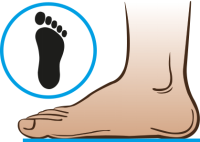
Prepared by Team of Consultant Paediatrics and Consultant Paediatrics, Orthopaedic & Trauma Surgeon
Gleneagles Kuala Lumpur
A child’s musculoskeletal growth is crucial for support and stability in their bodies. Healthy development can sometimes be interfered with, presenting deformities that can be seen at birth or while the child is growing.
Are you a parent who has a child who in-toes and frequently trips and falls? Or do you notice your child’s legs are bowed, or that she has feet that are flat or deformed?
These are observable differences from a regular musculoskeletal growth and development in a child. A thriving musculoskeletal system provides form, support, stability and movement to the body. Many young children have flatfeet, toe walking, pigeon toes, bowlegs, and knock-knees. As they grow, some of these conditions correct themselves without treatment.
Flatfeet
Flatfeet usually don't cause problems. Children’s arches develop as they grow. Your doctor may not prescribe any treatment such as special shoes because these do not remedy the condition. Your child can still play and be active in sports despite having flat feet.
Toe Walking
It is common among toddlers as they learn to walk, especially during the second year of life. By age 3 however, toe walking should go away, although it lasts in some children. There isn’t cause for concern if you notice your toddler toe-walking occasionally. However, children who walk on their toes almost all the time and continue to do so after age 4 should see a doctor to check for underlying medical conditions.
Pigeon Toe
Pigeon toes, or in-toeing, is a condition that causes the toes to point in. It is common in infants and young children. Your child’s feet curve inward instead of pointing straight ahead when walking or running. A child will grow out of this condition naturally. If your child’s in- toeing problem persists after the age of nine; your doctor may recommend special shoes to correct the problem if it persists. In-toeing doesn’t cause your child any pain and it does not interfere with the way your child learns to walk.

Wait a minute